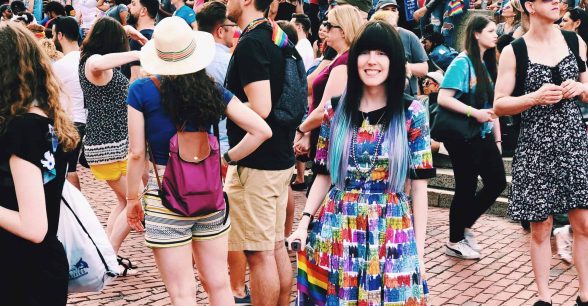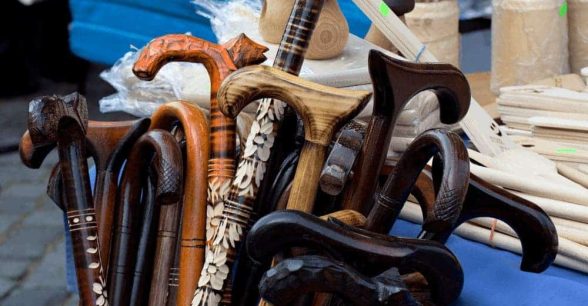The Pandemic Helped Me Disclose My Multiple Sclerosis
A simple question started it all. Last summer, a woman at my church named Jan was coordinating a socially-distanced approach for our annual school supply giveaway, and she asked if I’d be willing to staff a tent as part of a drive-through event in August.
Before the pandemic, I rarely told acquaintances about my multiple sclerosis (or M.S.). Now 53, I had battled a relapsing-remitting form of the disease for more than twenty years behind a wall of secrecy.
In lighter moments, I tend to think of M.S. as a comedy of errors, what happens when your immune system decides to wage war on your own body by mistake. What’s not funny are the symptoms, and in my case, include a slow walk and a lazy left leg. Monthly infusions of a special drug slowed the progression of my disease; however, I was ashamed of my illness because it’s erratic and tricky to explain.
Fortunately, the man who became my second husband needed no droll elevator speech—he didn’t mind hearing the long version of my story. We had recently married, and I started attending services and volunteering at his church, Science Hill Friends Meeting. I so longed to find my place within this vibrant community of Quakers in the rolling hills of central North Carolina, but the shame of my M.S. held me back.
“I would do it myself,” said Jan slowly. “But I have dermatomyositis, a neuromuscular disorder. Unfortunately, I can’t tolerate the heat.”
The spread of the coronavirus, and its particular danger to those with underlying conditions such as mine, changed everything. New friends such as Jan freely admitted their own vulnerabilities: asthma, diabetes, heart ailments, kidney disease, and many other illnesses just as serious as M.S.
Her admission loosened the words from my throat. “And I have multiple sclerosis, which means I don’t function very well in hot weather either.”
With this confession, the weight of my burden rolled off my shoulders as easily as water. Jan simply nodded, and in that moment, a glimmer of solidarity flashed between us.
Living with M.S. taught me resourcefulness, the art of figuring out where to park when accessible spaces are occupied, or how to balance a little wheelbarrow to carry tools to the garden. As it turned out, no one else volunteered to staff the tent for school supplies, but my years of finding work-arounds spurred me to think of another way.
“Here’s what we’ll do,” I told Jan. “We’ll collect the supplies at the church, and in August we’ll drive them in our truck to the county education department. They’ll happily unload it and distribute the supplies to teachers.”
“I love it!” she said. “What can I do?”
“Nothing at all,” I said. Then I thought of her famous dessert. “Well…. I wouldn’t complain if you made your fabulous lemon bars.”
After my diagnosis at 32, my first neurologist advised against disclosing my illness at work, out of concern for my career. This made me paranoid and guarded around others. For fear of a debilitating relapse, I saved my sick days, and I also hoarded vacation time, which was easy because my first husband preferred skiing and camping trips that excluded me. The extra days enabled me to retire early from my job as a college admissions counselor, and eventually I built a better life with a man who supported me when I didn’t feel so well.
Now that I knew more about Jan, she and I became closer, and when the opportunity felt right, I shared my condition with others, such as Ann, a woman who had fought ovarian cancer and would take medication for the rest of her life. From this champion gardener, I learned how to grow romaine lettuce and string beans. My new friends made no apologies about their challenges, and their zest for life inspired me to contribute to our community on a deeper level. At their invitation, I began attending monthly meetings of the Quaker Ladies, a small group of women in their seventies and eighties who led community service projects for Science Hill.
Still, not everyone knew about my affliction. At our March meeting, I chatted with Margaret and Joyce, two ladies who sat at my end of the table. We all still wore masks, and out of safety, we brought our own lunches rather than our usual potluck. Yet the chatter seemed bubblier than ever. In their early eighties, many of the women had already been fully vaccinated. “You’re not eligible yet, are you?” asked Joyce.
Before my first confession to Jan, I might have hesitated to be honest. But this disclosure paved the way, and I piped up immediately. “Actually, I had my first shot last week,” I said proudly. “I’ll get my second on April 11.”
At these words, a hush fell over our side of the table, and even in masks, I saw an eyebrow or two rise up out of surprise. Then I explained that I qualified early for the vaccine because of my M.S. “Good for you,” said Joyce. “All right!” declared Margaret. Their reaction and the connection I felt with these matriarchs made me wish I’d shared my illness earlier. Ironically, my fear of the coronavirus was tempered by the freedom it gave me. For once, I felt like one of the crowd.
New confidence about sharing my malady helped me find the words to speak to younger people as well. After church last Sunday, I reminisced with Jan about how far I’ve come, and Peyton, an eleven-year-old boy and one of my favorite youngsters, approached us and listened intently. “What is M.S.?” he asked, as I walked away. “It’s a disease of the nervous system,” I explained. “It means that sometimes the signal to my brain doesn’t always reach my leg and I stumble.”
“Oh,” he simply said. His reaction was as casual as if I’d admitted to having a common
cold. “You know what?” He held a hand over his head and laughed. “I’m almost as tall as you!” I chuckled too, amazed at how children often take in stride so easily the things that adults worry about.
I didn’t think Jan had overheard my words with Peyton but that very night she sent me an email. She had indeed recognized another major leap for me. Her subject line read: “Time for lemon bars again!”
For years, I thought my stoicism made me stronger, but now I realize that being honest helped me connect more deeply with the people in my life. It enhanced my empathy and cured my shame.
About Rooted In Rights
Rooted in Rights exists to amplify the perspectives of the disability community. Blog posts and storyteller videos that we publish and content we re-share on social media do not necessarily reflect the opinions or values of Rooted in Rights nor indicate an endorsement of a program or service by Rooted in Rights. We respect and aim to reflect the diversity of opinions and experiences of the disability community. Rooted in Rights seeks to highlight discussions, not direct them. Learn more about Rooted In Rights



